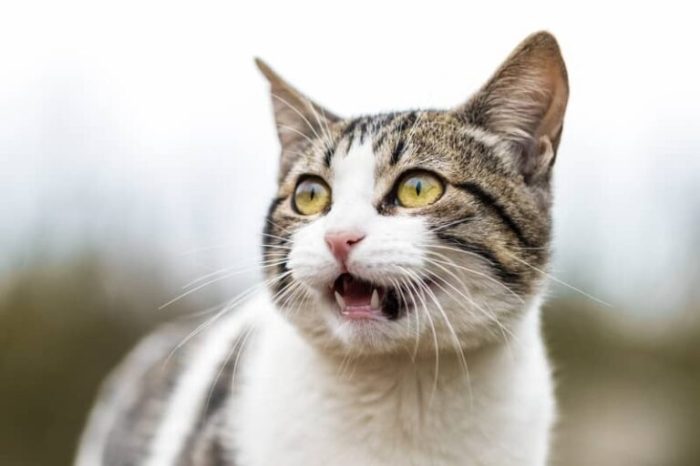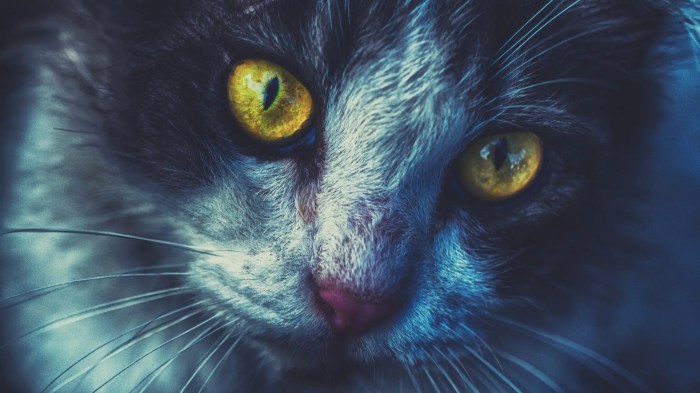Cat crying in the morning superstition – The superstition of a cat crying in the morning holds a prominent place in various cultures, carrying with it a myriad of interpretations and beliefs. This widespread notion, steeped in folklore and tradition, has permeated literature, art, and daily life, shaping human interactions with these enigmatic creatures.
From its possible origins in ancient superstitions to its scientific explanations, this superstition has evolved over time. Understanding the underlying causes of cat crying, such as hunger or illness, can help dispel superstitious beliefs and promote rational thinking.
Superstitions about Cats Crying in the Morning

Cats crying in the morning is widely believed to bring bad luck, a superstition with deep roots in various cultures and historical contexts. This belief is often associated with the notion that cats have supernatural abilities and can sense impending misfortunes or evil spirits.
The origins of this superstition may stem from ancient beliefs that cats were connected to the underworld or possessed mystical powers. In some cultures, cats were seen as guardians of the home and protectors against evil, and their cries were interpreted as warnings of impending danger.
In literature, art, and folklore, the superstition about cats crying in the morning has been portrayed in numerous ways. For example, in Shakespeare’s play “Macbeth,” the witches’ prophecy of Macbeth’s downfall is accompanied by the sound of a cat crying.
Similarly, in Japanese folklore, the yokai known as the “bake-neko” is said to be a cat that cries like a human, bringing misfortune to those who hear it.
Scientific Explanations for Cat Crying

While superstition may attribute cats crying in the morning to supernatural causes, science provides more rational explanations for this behavior. Common reasons why cats may cry in the morning include:
- Hunger:Cats are often most active at dawn and dusk, and if they have not been fed before bed, they may wake up hungry and vocalize to get their owner’s attention.
- Boredom:Cats that are left alone for long periods or do not have enough mental stimulation may cry in the morning as a way to express their frustration or loneliness.
- Illness:Cats may also cry in the morning if they are experiencing pain or discomfort due to an underlying medical condition. It is important to consult with a veterinarian if your cat’s crying is accompanied by other symptoms such as lethargy, vomiting, or diarrhea.
Understanding these underlying causes can help dispel superstitious beliefs and promote responsible cat ownership. If your cat is crying in the morning, it is important to rule out any medical conditions and address their physical and emotional needs.
Cultural Variations in Superstitions

The superstition about cats crying in the morning varies across different cultures. In some cultures, it is believed to be a sign of good luck, while in others it is seen as a warning of misfortune.
In ancient Egypt, cats were revered as sacred animals, and their crying was believed to be a sign of divine favor. In contrast, in some European cultures, cats were associated with witchcraft and evil, and their cries were seen as a harbinger of bad luck.
Today, the superstition about cats crying in the morning persists in many cultures, but its interpretation and significance may vary depending on the region and individual beliefs.
Psychological Impact of Superstitions: Cat Crying In The Morning Superstition
Superstitions, including the belief about cats crying in the morning, can have a significant psychological impact on individuals. Believing in superstitions can lead to:
- Anxiety:Superstitions can create feelings of unease and worry, as individuals may fear the consequences of violating or ignoring a superstition.
- Fear:Superstitions can instill irrational fears, leading individuals to avoid certain situations or behaviors that are believed to bring bad luck.
- Cognitive biases:Superstitions can reinforce cognitive biases, such as confirmation bias, where individuals selectively seek out information that confirms their beliefs.
To overcome superstitious beliefs, it is important to engage in rational thinking and critical analysis. By questioning the validity of superstitions and seeking evidence-based information, individuals can develop a more realistic and logical understanding of the world.
General Inquiries
Why do cats cry in the morning?
Cats may cry in the morning due to various reasons, including hunger, boredom, or underlying medical conditions.
What are the cultural variations in the superstition of cat crying in the morning?
Different cultures hold varying beliefs about the significance of a cat crying in the morning, ranging from bad luck to a sign of good fortune.
How can we overcome superstitious beliefs?
Rational thinking, critical analysis, and consulting with experts can help us challenge superstitious beliefs and develop a more evidence-based mindset.